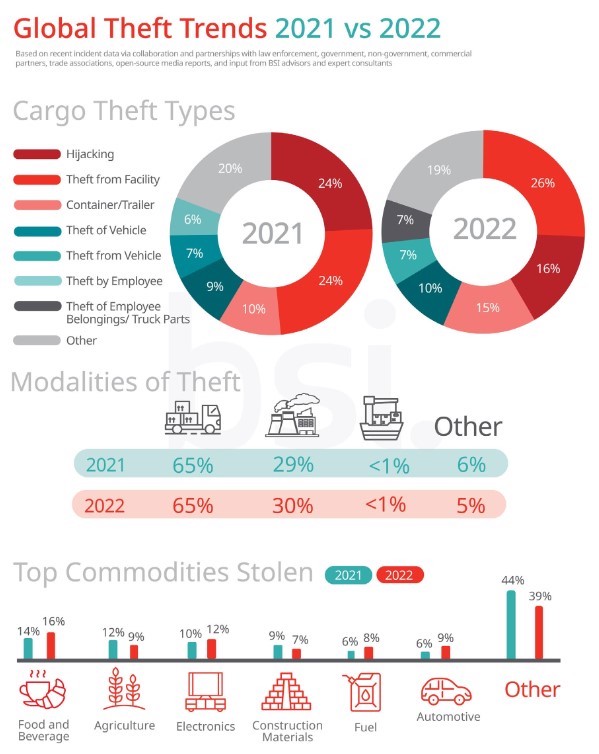As in the past the united trend analysis and experience of the three organisations, international freight insurer TT Club, the Transported Asset Protection Association’s Europe, Middle East & Africa region (TAPA EMEA), and BSI, the business improvement and standards consultants, supply concerted insight to the changing dynamics of cargo theft around the world. The 2022 Cargo Theft Report reflects this strength of observational data and comprehensive incident reporting.
The salient conclusions of this year’s report are:
- Consistent level of theft from facilities
- Increase in container and trailer theft
- Global reduction in hijackings
- Easing of international losses from unsecured parking and from areas adjacent to port facilities
- Inflationary trends effect black market demand for more basic goods
- Food and beverages, auto parts and fuel all increasingly targeted
- High-end electronics remain a frequent target
The over-arching trend is for criminals to adapt to inflation and lessened port congestion and evolve more fraudulent methods of targeting specific goods. “Our report explores these themes in more detail by way of case studies that look at how social unrest in Latin America, particularly Chile, Peru and Brazil, has provided a weakness exploited by thieves,” points out Mike Yarwood, MD Loss Prevention at TT. “Also, how in South Asia crime involving fraudulent practices, like fictitious pickups to target cargo, are manifest.”

Of the increases in various types of commodities stolen, as illustrated above, TAPA EMEA identified a significant year-on-year rise in the number of fuel thefts recorded in the region, one of the most prominent trends recorded. “This is clearly driven by the impact of the war in Ukraine on global oil prices and the cost-of-living crisis affecting consumers in many countries. We gathered intelligence on fuel losses in 28 countries across EMEA, but mostly in Germany and the United Kingdom, which accounted for 72%. Higher value fuel crimes also signalled the involvement of bigger organised crime groups, notably thefts from fuel depots,” said Thorsten Neumann, President & CEO of TAPA EMEA.
Consistent with past publications, advice on steps that can be taken to mitigate the risk of theft are offered in the report. “In particular, we are keen to give guidance on how operators can combat the practice of fictious pick-ups and the threat of insider influence in cargo crime,” said David Fairnie, BSI’s Principal Consultant on Supply Chain Security. “Our guidelines are extensive and they can help to reduce risk and enhance the overall security and resilience of the supply chain. However, it’s important to recognize that there is no one-size-fits-all approach. Each organization must develop a tailored risk management plan based on its specific risks and circumstances.”








